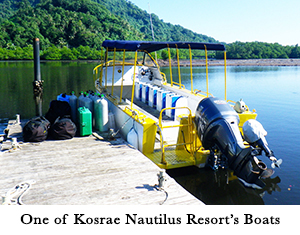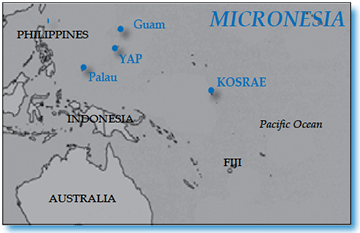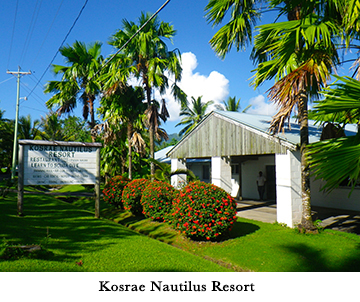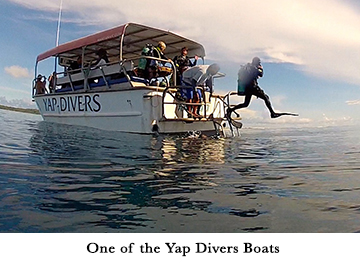Kosrae and Yap, MicronesiaContents of this Issue: Shark Explorers, Cape Town, South Africa Mozambique, Mexico, Philippines . . . Divers, Your Very Presence Affects Reef Fish Behavior Just Think, He Might Have Been in Your Dive Class Barracuda Slaughter at McCauley Memorial Letters about our Latest Articles Is Your Camera Hurting Marine Life? Editorial Office: Ben Davison Publisher and Editor Undercurrent 3020 Bridgeway, Suite 102 Sausalito, CA 94965 two magical stopovers in the mid-Pacific from the October, 2015 issue of Undercurrent
Dear Fellow Diver: "How many sharks did you see?" "There were so many, I lost count." "I saw at least three dozen." "And what about that awesome group of eagle rays?" Had you been aboard my dive boat after our dive at Hiroshi Point in Kosrae in July, you would have heard this exuberant conversation. Pretty amazing. One of the four Federated States of Micronesia, Kosrae earns its reputation as the "hard coral capital of the world," but it's also a hard-to-get-to destination, requiring stops at Majuro and Kwajalein, in the Marshall Islands, after departing from Honolulu. Because the United Airlines flight doubles as a U.S. mail and island supply flight, our plane departed late to accommodate cargo loading. When I deplaned nine hours later into the heat and humidity, I felt like I had hit a brick wall.
Daily, we traveled five minutes by van to their 27-foot Poseidon, a comfortable covered aluminum boat with tank racks down the center, a bench for gearing up, and plenty of storage. Departing from Lelu Harbor, we dived the north and east sides of the island, once as the only divers, twice sharing the boat with two others, and never saw another dive boat. Sixty mooring buoys mean dive boats are not dropping anchor, so the reefs, which begin at 30 to 40 feet along a wall sloping down for hundreds of feet, are free from diver destruction, though they show occasional storm and surge damage. Being someone who mostly dives the Caribbean, I was amazed at the range of coral species. At Hiroshi Point, going no deeper than 60 feet, I swam through a Dr. Seuss storybook, with fish everywhere, including Moorish idols, emperor angels, bird wrasses, pyramid butterflies, and clownfish. The coral looked like dripping sand castle homes that might be found in Whoville. Resembling inverted icicles, another type of coral reminded me of a cave full of stalagmites, although I was still in open water. During my dive on the aptly named Eagle Ray Wall, a squadron of eagle rays swam slowly past, then a white-tip reef shark cruised by, followed by a playful eagle ray, while several sea turtles meandered past. Flame angels were everywhere, as were butterfly and angelfish varieties. With a little current at most sites, we drifted along for an hour or so, with our guide towing a float so we could eventually be picked up wherever we surfaced. Doug drove the boat and led the dives, taking turns with native Kosraean Salik, a hard-working, slender man around age 40 who spoke excellent English, also drove the van for our airport transfers and waited tables at the resort. If I needed help, Doug or Salik was there to assist me with my gear, then I backrolled in, exiting after the dive up the sturdy ladder.
Days began with a breakfast of pancakes or French toast, eggs and fried rice, sitting either indoors in the airconditioned restaurant or outside on a covered patio overlooking the pool. After two dives, Doug served fish sandwiches, tangerines and bananas aboard the boat while we off-gassed before our third dive (two-tank divers were taken back to the marina). Afternoons were quiet, marked with either a good book or a dip in the pool. Before dinner, cocktail hour in the small bar was limited to beer and wine (never on Sunday -- the Christian culture dictates a day of rest, the island shuts down, diving isn't offered, even shell collecting is prohibited). For dinner, one can get pizza, burgers, fish, chicken or steak, supplemented with locally grown vegetables and fruits. Kosrae is so remote that any hang-up with a supply ship affects the menu. Sure enough, one night there were no potatoes for the fresh wahoo and chips, so they substituted breadfruit chips. Surprise: They were better than French fries.
While I greatly enjoyed the diving, and quickly adapted to the basic digs and limited restaurant, I continued my journey westward four days later, when the island hopper came back through. Because the plane stopped in Pohnpei and Chuuk, it took five hours to reach Guam, where I boarded another plane for the 75-minute flight to Yap, another Federated State. Upon arrival, a rep from Manta Ray Bay Hotel offered me a cold bottle of water and cool face towel before the 10-minute van transfer to the hotel. At the hotel, a board outside the dive shop had the next day's boat schedule. I was surprised to see my buddy's and my names missing, especially since we had prepaid our dives. We truly didn't exist in the hotel staff's mind, because at 3 a.m., they let themselves into our room with arriving guests, believing the room was unoccupied. The next morning, John, Yap Divers' manager, apologized for the mix-up and quickly added an extra boat with additional crew to the schedule. Divers come to Yap for mantas, and our first dive did not disappoint -- we had a nice encounter with a couple of 10- to 12-foot males. Making 20 dives, usually three a day, I met up with mantas on six of them. At Yap Caverns, my guide, Charles, led us through a maze of coral caverns and swim-throughs. Two small leaffish, looking like sunken tree leaves, sought refuge inside a cavern near a large moray eel. Sunlight shining through an opening overhead created a beautiful underwater cathedral. After the final swim-through, I dropped from 40 feet down to the white sandy bottom at 60 feet, exiting over a wall at 75 feet to see dozens of patrolling whitetip sharks. As I continued along the wall, nudibranchs lolled in the coral. When I surfaced, hundreds of spinner dolphins were frolicking around the boat. Once we were underway, they rode the bow waves and put on an amazing jumpand- spin show.
At Vertigo, lots and lots of sharks hung out. I backrolled in, and even before I bobbed to the surface, I saw my first. Wielding my GoPro, for the next 30 minutes I shot at least 25 reef sharks hanging out at the edge of the wall. The smaller, faster black-tips darted between divers. Once I tired of the hypnotic circling sharks, I joined the group to drift along the wall, where I spied a dog-faced puffer, two graceful eagle rays and a camouflaged octopus. On the walls, we had over 100 feet of visibility, with lots of hard coral variety and a little soft coral. Where the mantas got cleaned, visibility hovered around 45 feet. With Nitrox, I was able to do at least an hour on every dive, most of which were drifts. One day at dusk, I dived shallow Rainbow Reef, where my guide directed me to the precise home of the colorful Mandarin fish. Every night, the tiny fish come out to mate, and I watched a number of them dart in and out of the finger coral that hides them during the day. After 45 minutes, I climbed back into the boat to watch the sunset while sipping hot tea served by the captain.
At 4:30 p.m., the cannon fired to signal happy hour at the Crow's Nest Bar, which served specialty drinks and beer from the Stone Money Brewing Company on the top deck. Breakfast is served on level one of the Mnuw, and you order your egg preference (the women serving remembered my name and tea preference). It's an odd room, with uneven, sloping wooden floors and dark wood walls, but plenty of daylight. Lunch and dinner were served in air-conditioning on the second deck, or in the open-air third deck, where tables in rows allowed groups to sit together. My buddy and I joined others, sharing stories of our underwater adventures. On the top deck, a movie screen displayed nightly videos, guest productions and movies. The lunch and dinner menu offered sandwiches, burgers, salads and pizza, as well as daily fresh fish specials -- fish soup, fish tacos, fish sandwiches, beer-battered fish and chips and sashimi. Dessert options included cake and ice cream, milkshakes and coconut cookies. Three-tank divers order lunch the night before; it's served on board the boat between dives two and three. Back to diving. Charles, our friendly, smiling guide, who spoke English well, had extensive knowledge of the reefs and tides, and led great tours. He lived on one of Yap's outer islands, but stayed on the main island while working. Each diving day, Charles retrieved my gear from my locker, loaded it on the dive boat and set it up. At day's end, he rinsed my gear and stowed it in my locker, hanging my wetsuit to dry. Inside the shop are dedicated camera workstations, and outside, there are freshwater rinse tanks and racks for drying gear.
Bill Acker, who started the hotel and dive operation after moving to Yap from Texas 30 years ago, is a personable guy who always smiled and said hello. He was our dive guide our last day, and his mantas showed up on two out of the three dives. Between dives, he spun tales of piracy in how he acquired the Mnuw. Captain Willie, teeth stained red from Betel nut and a white beard sharply contrasting with his dark skin, spent our surface intervals floating on his back in the calm sea, smoking a cigarette. Sadly, however, diving was not perfect, thanks to a rude guest we referred to as "That Guy," seemingly clueless about when to show up. He always arrived very late. We would roll our eyes at one another and wait for the crew to help the 40-something, too-hefty American with his daily malfunction. A know-it-all, he interjected his opinion into everyone's conversion and photobombed everyone's shots. Even with oversized tanks, he became a snorkeler while the rest of us finished the dives. One evening he tripped, badly scuffing his elbow, but against our prayers, he showed up the next morning with a nasty, bloody arm. Another day he complained of an upset stomach, but instead of passing on the dive trip, he just vomited between dives. At the end of the week, Charles wondered out loud about contacting a local priest who was often called upon to make it rain. Maybe he could make "That Guy" go away. On my last day, I joined seven others for a drive around the four islands, all connected by short bridges, comprising mainland Yap (there are many outer islands, some 300 miles away). The Yapese people have maintained much of their ancient culture, with most still living in villages, where women perform traditional dances topless and the men are dressed in loin clothes, just as their ancestors had. We were told of Yap's role in WWII and shown hand-made canoes, plane wreckage, a men's house, the community building and Stone Money Bank. After the tour, I stopped in at the hotel's spa for a one-hour coconut oil full-body massage, just what I needed to prepare me for my long journey home. The flights out of Yap leave at ridiculous times, making it necessary to pay extra for a late checkout. My flight to Guam departed at 3:30 a.m. Hotel staff failed to explain the checkout procedure to the guests, so it was clumsy and disorganized at the scheduled 1:30 a.m. shuttle time, leading to unnecessary delays at the airport. One can get grumpy at such a God-awful hour. Yes, Kosrae and Yap require a long, inconvenient journey. But the superb diving, the local culture and the undeveloped environs provided a very satisfying trip. If you're patient, at home with a more simple life, curious about a unique culture and South Pacific underwater life, and especially tolerant of a lousy air schedule, you'll be in for a fine adventure. -- L.E.D. Our undercover diver's bio: L.E.D. says, "I earned my openwater certification in Florida in 1998 and received my instructor credentials in 2000. Having made more than 1,000 dives, I've dived in seven mainland U.S. states, 20 Caribbean islands, Canada, Hawaii and Micronesia, enabled to some degree by being my own travel agent. Most recently, I earned my full cave diver certification, and I dive Yucatan's stunning cenotes monthly."
|

I want to get all the stories! Tell me how I can become an Undercurrent Online Member and get online access to all the articles of Undercurrent as well as thousands of first hand reports on dive operations world-wide
| Home | Online Members Area | My Account |
Login
|
Join
|
| Travel Index |
Dive Resort & Liveaboard Reviews
|
Featured Reports
|
Recent
Issues
|
Back Issues
|
|
Dive Gear
Index
|
Health/Safety Index
|
Environment & Misc.
Index
|
Seasonal Planner
|
Blogs
|
Free Articles
|
Book Picks
|
News
|
|
Special Offers
|
RSS
|
FAQ
|
About Us
|
Contact Us
|
Links
|
3020 Bridgeway, Ste 102, Sausalito, Ca 94965
All rights reserved.

 Kosrae Nautilus Resort sent a driver to pick up my
buddy and me, and the 15-minute drive there offered a
preview of the "Island of the Sleeping Lady," a mountainous
island covered with dense vegetation, banana trees and
coconut palms. Doug Beitz, once an Aussie fireman, and
his wife, Sally, run the resort, having built it in 1994
simply because they
wanted to do something
new. After we
checked in, softspoken
Doug sat
down with us to
discuss the kind of
diving we wanted.
The weather had
been unusual, he
said, with typhoons
to the north sending
swells, reducing
visibility and lowering the water temperature to
80 degrees from a year-round normal
of 83 degrees. Each morning, Doug
would check the weather to determine
which side of the island would
have the best conditions before
deciding what boat to take. He
keeps one at two different marinas
to get to the best diving.
Kosrae Nautilus Resort sent a driver to pick up my
buddy and me, and the 15-minute drive there offered a
preview of the "Island of the Sleeping Lady," a mountainous
island covered with dense vegetation, banana trees and
coconut palms. Doug Beitz, once an Aussie fireman, and
his wife, Sally, run the resort, having built it in 1994
simply because they
wanted to do something
new. After we
checked in, softspoken
Doug sat
down with us to
discuss the kind of
diving we wanted.
The weather had
been unusual, he
said, with typhoons
to the north sending
swells, reducing
visibility and lowering the water temperature to
80 degrees from a year-round normal
of 83 degrees. Each morning, Doug
would check the weather to determine
which side of the island would
have the best conditions before
deciding what boat to take. He
keeps one at two different marinas
to get to the best diving. We also dived in the harbor on a downed U.S. Navy seaplane, a Martin PBM
Mariner patrol bomber, and an armed Japanese transport ship sunk by Americans
during WWII. Visibility was a greenish 30 feet, but the Sunsang Maru was an
interesting wreck with a lot of life. Being only 50 feet deep, I had lots of
time to observe the schools of butterflyfish and emperor angels that made the
wreck their home, as well as a cleaning
station, where blue-streak wrasses swam
in and out of a spadefish's gills. Though
underwater for 70 years, the ship was in
good shape, covered in coral wisps and
white drippy stuff that made the old wreck
look as if it were growing whiskers.
We also dived in the harbor on a downed U.S. Navy seaplane, a Martin PBM
Mariner patrol bomber, and an armed Japanese transport ship sunk by Americans
during WWII. Visibility was a greenish 30 feet, but the Sunsang Maru was an
interesting wreck with a lot of life. Being only 50 feet deep, I had lots of
time to observe the schools of butterflyfish and emperor angels that made the
wreck their home, as well as a cleaning
station, where blue-streak wrasses swam
in and out of a spadefish's gills. Though
underwater for 70 years, the ship was in
good shape, covered in coral wisps and
white drippy stuff that made the old wreck
look as if it were growing whiskers. The hotel, of cement block construction with 16 basic rooms and two selfcontained
units, sits among tropical gardens and across the street from its
own beach and a blue hole for snorkeling. My plain but functional room had two
comfortable double beds, but with no dresser for clothes, I lived out of my
suitcase. The AC, along with a ceiling fan, kept the room cold. The bathroom
had a tub/shower combo, but the only sink was in the main room, with a small
counter and refrigerator. Solar roof heaters produced plenty of hot water.
The hotel, of cement block construction with 16 basic rooms and two selfcontained
units, sits among tropical gardens and across the street from its
own beach and a blue hole for snorkeling. My plain but functional room had two
comfortable double beds, but with no dresser for clothes, I lived out of my
suitcase. The AC, along with a ceiling fan, kept the room cold. The bathroom
had a tub/shower combo, but the only sink was in the main room, with a small
counter and refrigerator. Solar roof heaters produced plenty of hot water. Manta Ray Bay Hotel is well built,
with 35 individually decorated rooms. Our
two queen-sized comfortable beds sported
bedspreads decorated with large eagle rays.
The modern bathroom had a shower with plenty
of hot water, a toilet in one room, and
the sink in the main area. Air conditioning
and a ceiling fan provided welcome relief
from Yap's heat and humidity. My room, the
Eagle Ray room, was on the second floor with a full ocean view overlooking
the Mnuw (pronounced M-noo), a 170-
foot Indonesian schooner that had
been converted into the restaurant
and bar.
Manta Ray Bay Hotel is well built,
with 35 individually decorated rooms. Our
two queen-sized comfortable beds sported
bedspreads decorated with large eagle rays.
The modern bathroom had a shower with plenty
of hot water, a toilet in one room, and
the sink in the main area. Air conditioning
and a ceiling fan provided welcome relief
from Yap's heat and humidity. My room, the
Eagle Ray room, was on the second floor with a full ocean view overlooking
the Mnuw (pronounced M-noo), a 170-
foot Indonesian schooner that had
been converted into the restaurant
and bar. While they have a fleet of eight boats ranging from 21 to 38 feet, I
started in a small, fast boat that slipped quickly through the mangrove channels.
Six divers was a comfortable number, but when we had eight with their
cameras, it was too crowded. Entry required a backroll, with exits up a sturdy
ladder. When even more divers arrived, I was moved to the big boat. All boats
had covers for shade, but the big boat had cushioned seats and more space,
important because some sites took an hour to reach. All two-tank dives included
water or hot tea, a snack and big, soft towels. Guides lead the dives, but
there are no restrictions.
While they have a fleet of eight boats ranging from 21 to 38 feet, I
started in a small, fast boat that slipped quickly through the mangrove channels.
Six divers was a comfortable number, but when we had eight with their
cameras, it was too crowded. Entry required a backroll, with exits up a sturdy
ladder. When even more divers arrived, I was moved to the big boat. All boats
had covers for shade, but the big boat had cushioned seats and more space,
important because some sites took an hour to reach. All two-tank dives included
water or hot tea, a snack and big, soft towels. Guides lead the dives, but
there are no restrictions. Divers Compass: My costs at Kosrae Nautilus Resort were $155
for a double room per night (it's $140 for a single), $135
for a two-tank day, including lunch (a third dive can be added
for $40, and night dives cost $80), and meals for four days
for two people ran around $50 a day . . . booking directly
through the resort, paying cash, or being a return guest can
bring a discount . . . the resort can also arrange land tours,
and fishing can be arranged . . . electricity is standard U.S.
110-volt; the U.S. dollar is official currency . . . tanks are
80 cu ft. aluminum with yoke valves that can be converted to DIN; Nitrox is
available . . . At Manta Bay Resort in Yap, it cost $1,509 per person for
seven nights and 10 dives, including transfers, tax, breakfast; it's $249 per
person to supersize the package, which included lunch, Nitrox and a third
dive each day . . . Night dives and Mandarin fish dives are $58 each; a
sixth day of three-tank diving cost $165 . . . Meals cost $200 for two people
for a week . . . 80 cu ft. aluminum tanks with yoke valves are normal,
although 15-liter tanks are available but no DIN valves; night dives and a
shark feed are offered . . . Activities for non-divers are available . . . electricity is standard U.S. 110-volt, and the U.S. dollar is the official
currency . . . Websites - Kosrae Nautilus Resort -
Divers Compass: My costs at Kosrae Nautilus Resort were $155
for a double room per night (it's $140 for a single), $135
for a two-tank day, including lunch (a third dive can be added
for $40, and night dives cost $80), and meals for four days
for two people ran around $50 a day . . . booking directly
through the resort, paying cash, or being a return guest can
bring a discount . . . the resort can also arrange land tours,
and fishing can be arranged . . . electricity is standard U.S.
110-volt; the U.S. dollar is official currency . . . tanks are
80 cu ft. aluminum with yoke valves that can be converted to DIN; Nitrox is
available . . . At Manta Bay Resort in Yap, it cost $1,509 per person for
seven nights and 10 dives, including transfers, tax, breakfast; it's $249 per
person to supersize the package, which included lunch, Nitrox and a third
dive each day . . . Night dives and Mandarin fish dives are $58 each; a
sixth day of three-tank diving cost $165 . . . Meals cost $200 for two people
for a week . . . 80 cu ft. aluminum tanks with yoke valves are normal,
although 15-liter tanks are available but no DIN valves; night dives and a
shark feed are offered . . . Activities for non-divers are available . . . electricity is standard U.S. 110-volt, and the U.S. dollar is the official
currency . . . Websites - Kosrae Nautilus Resort - 